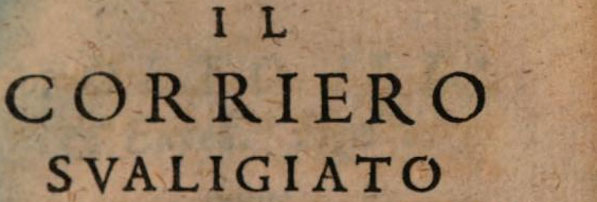Ferrante Pallavicino, “Ville-franche,” 1644 (Google Books)
Lister read this libertine and satiric work, probably rather furtively, in May 1665. The highly cultured Ferrante Pallavicino (1615-44) ‘recruited by Richelieu to establish an academy for the study of Italian literature, was captured and beheaded by papal authorities’ for his publication of enormously popular works which were considered obscene. 1
Pallavicino was a member of the Accademi degli Incogniti (Academy of the Unknowns) founded in Venice in 1630 by students of Cesare Cremonini. The group ‘openly espoused religious skepticism and libertine morality’, and from this group a direct line can be traced to thinkers of the French Enlightenment.2 Pallavicino’s mistake was to leave the ‘protective embrace’ of the Venetian republic, thus ‘becoming the martyr among the Incogniti’. 3
His novella was published under the pseudonym Spironcini, and originally was in Italian as Il Corriere svaligiato. In this piece of epistolary fiction, Pallavicino invented an important device: ‘the transgressive metaphor of the Post boy robbed of his mail, or the packet broke open’. 4 The work was also highly political, its plot device consisting of four courtiers reading and commenting on letters that their prince ordered stolen from a courier. This conceit allowed Pallavicino to satirize the court of Pope Urban VIII Barberini, ‘the barber who cut the beard of Christ’, the Jesuits, and the Inquisition 5 It was little wonder that after its publication the papal court went to great lengths to kidnap and execute Pallavicino who was on his way to Paris to serve at the French Court.
- James Turner, Schooling Sex: Libertine Literature and Erotic Education in Italy, France and England (Oxford: Oxford University Press, 2003), 26. ↩
- Edward Muir, The Culture Wars of the Late Renaissance: Skeptics, Libertines, and Opera (Cambridge: Harvard University Press, 2007), 22. ↩
- Muir, The Culture Wars, 22. ↩
- Turner, Schooling Sex, 86. ↩
- Muir, The Culture Wars, 86. ↩

